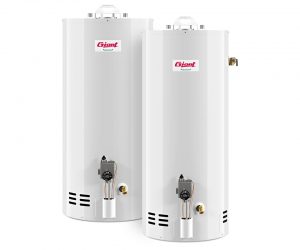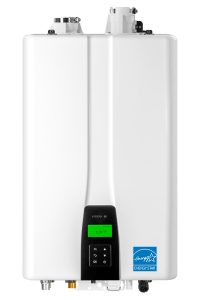Choosing the right water heater is a pivotal decision, particularly for new homeowners and those with a commitment to environmental responsibility in Ontario. The decision between gas and electric water heaters has far-reaching consequences, influencing both upfront costs and the long-term sustainability of a home’s energy consumption.
There are many intricacies of gas and electric water heaters, and you should have as much information as possible in order to make informed decisions based on your unique needs and priorities.
Hot Water Ottawa is here to help!
Understanding Gas and Electric Water Heaters
 Both gas and electric water heaters store hot water in a tank, ensuring a ready supply for various household needs. Understanding the basic mechanics of each type is a crucial first step in making an informed decision for your home.
Both gas and electric water heaters store hot water in a tank, ensuring a ready supply for various household needs. Understanding the basic mechanics of each type is a crucial first step in making an informed decision for your home.
Gas Water Heater
Gas water heaters operate by using a burner, typically located at the bottom of the unit. The burner is fueled by natural gas or propane, creating a flame that heats the water stored in the tank. Here’s a step-by-step breakdown of how a gas water heater works:
- Cold Water Inlet: Cold water enters the tank through a dip tube, ensuring it goes to the bottom where it can be heated.
- Thermostat Activation: When the water temperature in the tank drops below the set temperature on the thermostat, it triggers the gas valve to open.
- Gas Burner Ignition: The gas burner ignites, producing a flame that heats the water surrounding it.
- Heat Transfer: The heat from the burner is transferred to the water, raising its temperature.
- Hot Water Outlet: Once the water reaches the desired temperature, it is ready for use and can be drawn from the outlet at the top of the tank.
It’s important to note that a gas water heater requires a flue or chimney to vent the combustion byproducts safely outside. This ventilation process is crucial for the safe and efficient operation of the gas water heater.
Electric Water Heater
Electric water heaters, in contrast, use heating elements submerged in the water to generate heat. Here’s how an electric water heater works:
- Cold Water Inlet: Like gas water heaters, cold water enters the tank through a dip tube, ensuring it is directed to the bottom of the tank.
- Thermostat Activation: When the water temperature drops below the set level on the thermostat, it signals the electric heating elements to turn on.
- Electric Heating Element Activation: The electric heating elements, typically made of metal and surrounded by an insulating material, become hot when electricity flows through them.
- Heat Transfer: The heat generated by the electric elements is transferred to the water, raising its temperature.
- Hot Water Outlet: Once the water reaches the desired temperature, it is available for use and can be drawn from the outlet at the top of the tank.
Electric water heaters are relatively straightforward in their design, as they lack the combustion process found in a gas hot water heater. This makes them generally easier to install and maintain, with fewer components involved.
Installation and Operating Costs
While electric heaters generally have a lower upfront cost, gas heaters may incur higher installation expenses. However, in Ontario, where natural gas prices are often more economical than electricity rates, the operational costs of gas water heaters can be significantly lower over the long term. It becomes essential for homeowners to carefully weigh the initial investment against the potential savings in energy bills.
Let’s take a deeper look at the costs of both types of water heaters.
Gas Water Heater
- Unit Cost: Gas water heaters tend to have a higher upfront cost compared to electric heaters. This is partly due to the complexity of the system, which includes a gas burner, venting system, and additional safety features.
- Ventilation Requirements: Gas hot water heaters require proper ventilation to expel combustion byproducts safely. This may involve installing a flue or chimney, adding to the overall installation complexity and cost.
- Gas Line Installation: If your home does not already have a gas line, the installation of one will add to the expenses. This can be a significant factor in homes that were not previously equipped with natural gas.
- Lower Natural Gas Prices: Ontario often benefits from lower natural gas prices compared to electricity rates. This can result in significant savings over the long term for homes using gas hot water heaters.
- Energy Efficiency: Gas water heaters are known for their efficiency in quickly heating water, minimizing the time the burner is active and consequently reducing energy consumption.
- Favorable for High Demand: In homes with high water demand, such as those with multiple bathrooms or occupants, gas water heaters may be more cost-effective due to their rapid heating capabilities.
Electric Water Heater
- Unit Cost: Electric water heaters generally have a lower upfront cost compared to gas heaters. The units themselves are often less expensive, and installation is typically simpler.
- No Ventilation Requirements: Unlike gas water heaters, electric units do not require a venting system. This eliminates the need for a chimney or flue, simplifying the installation process and reducing associated costs.
- Ease of Installation: Electric water heaters are generally easier to install, making them a more straightforward option for homes where a gas line and complex venting systems are not already in place.
- Electricity Rates: Ontario’s electricity rates can be higher than natural gas prices. While electric water heaters are generally more energy-efficient than in the past, the cost of electricity can still contribute to higher operating expenses.
- Potential Off-Peak Savings: Some homeowners may take advantage of time-of-use electricity pricing, using heated water during off-peak hours to reduce costs. This strategy can help mitigate the higher electricity rates.
- Suitable for Moderate Demand: Electric water heaters are well-suited for homes with moderate hot water demands, and advancements in technology have improved their overall efficiency.
Environmental Impact
As environmental consciousness becomes increasingly integral to decision-making, evaluating the eco-friendliness of gas vs electric water heaters is crucial. Let’s delve into the environmental considerations of each type, with a focus on highlighting the advantages of electric heaters and their potential to reduce the overall carbon footprint.
Gas Water Heater
- Greenhouse Gas Emissions: One of the primary environmental concerns associated with gas water heaters is the emission of greenhouse gases during combustion. Natural gas, the common fuel for these heaters, releases carbon dioxide (CO2) when burned, contributing to climate change.
- Ventilation Impact: Gas water heaters require proper ventilation to expel combustion byproducts safely and prevent gas leaks from endangering your family. This process involves the release of additional emissions and may contribute to air pollution if not adequately managed.
- Limited Renewable Integration: While advancements in technology continue to improve the efficiency of gas water heaters, their reliance on fossil fuels limits the incorporation of renewable energy sources directly into the heating process.
Electric Water Heater
- Zero On-Site Emissions: One of the primary environmental benefits of electric water heaters is that they produce zero on-site emissions during operation. Unlike gas heaters, electric units do not burn fuel, eliminating the release of harmful pollutants and greenhouse gases directly at the point of use.
- Low Carbon Grid Impact: In regions like Ontario, where the electricity grid has a relatively low carbon footprint due to a high proportion of renewable energy sources and nuclear power, electric water heaters can leverage a cleaner energy source.
- Integration of Renewable Energy: Electric water heaters provide an opportunity for homeowners to further reduce their environmental impact by integrating renewable energy sources into their homes. Solar panels or wind turbines can generate electricity to power the water heater, effectively reducing reliance on conventional power sources.
- Advancements in Efficiency: Ongoing advancements in the efficiency of electric water heaters contribute to their eco-friendliness. High-efficiency models reduce overall energy consumption, further minimizing the environmental impact of heating water.
Efficiency and Maintenance
Maintenance is crucial for the longevity and efficient operation of water heaters. Regular upkeep helps prevent issues and ensures optimal performance. Both types of water heater typically have a lifespan of 10 to 15 years, given proper and regular maintenance.
Gas Water Heater
- Generally require more maintenance compared to their electric counterparts due to the combustion process involved.
- Regular inspection of the burner, pilot light, and ventilation system is essential to ensure safe and efficient operation.
- Periodic checks for gas leaks and proper venting are critical for safety and performance.
Electric Water Heater
- Often considered more straightforward in terms of maintenance.
- The absence of a combustion process means there are fewer components to inspect, making electric heaters potentially less demanding in terms of maintenance.
- Routine checks on the heating elements, thermostat, and anode rod (if applicable) are recommended.
 Exploring Tankless Water Heaters
Exploring Tankless Water Heaters
As an alternative to traditional tank-style water heaters, a tankless hot water heater offers a unique approach. These units heat water on demand, eliminating the need for a storage tank. Tankless water heaters come in both gas and electric variants, each tankless unit comes with its own set of advantages and drawbacks.
Gas tankless water heaters are praised for their ability to provide endless hot water and are often more energy-efficient than their tank-style counterparts. However, they can be more expensive to install and may require a larger gas line to accommodate the increased demand.
Electric tankless water heaters, while potentially more straightforward to install, may struggle to meet the demands of larger households simultaneously using hot water. They can be a space-saving and energy-efficient option for smaller households with moderate hot water needs.
Not only can Hot Water Ottawa help you decide which type of tankless hot water heater is right for you—we can install it, too!
Making the Right Decision for Your Home
The decision on whether to get a new gas or electric water heater requires striking a balance between initial costs and long-term savings. You also need to consider both economic and environmental aspects. Seeking professional advice from experts in the field, such as those at Hot Water Ottawa, can provide invaluable insights tailored to individual circumstances. Professional guidance on choosing a gas vs electric water heater takes into account the specific needs of a household, helping you make decisions that align with your values and budget.
Hot Water Ottawa is Here to Help You Choose
For personalized advice tailored to your specific needs, contact experts like Hot Water Ottawa. Our team can provide a free personalized quote and expert guidance, helping you navigate the decision-making process.
We’ll help you make an informed decision that aligns with your budget, sustainability goals, and household requirements. Reach out to Hot Water Ottawa for a comprehensive assessment and start enjoying the benefits of an efficient and cost-effective water heating solution tailored to your home.
